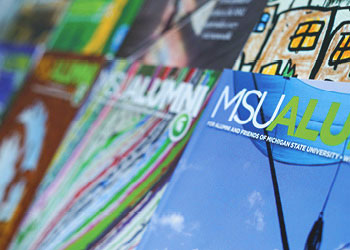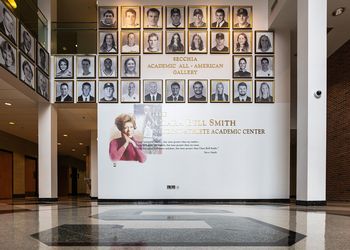Feature: President Peter McPherson

LEADING THE REINVENTION OF MSU (& HIGHER EDUCATION)
After two years as president, M. Peter McPherson has clearly emerged as a visionary leader in the mold of John A. Hannah, MSU's greatest president and his former mentor. In a brief period, McPherson has compiled a remarkable record of tangible achievements, many with nationwide reverberations.
When viewed as a whole, these triumphs reveal nothing less than a wholesale reinvention of higher education in light of changing societal needs. McPherson's successes are well known. They include the acquisition of a new law school, and the promulgation of guiding principles, the Tuition Guarantee, and the Technology Guarantee. He secured a $10.4 million annual increase in legislative support earmarked for learning technologies. He helped establish weekend and evening academic degree programs to accomodate a growing need. He brought as commencement speaker President Bill Clinton, the first sitting president to do so since Teddy Roosevelt. He tackled many problems in the athletics department head-on, and has launched us into a new era unshackled by past errors. He has not been afraid to make personnel changes where necessary. MSU fundraising has grown significantly under his leadership. He is spearheading a move to enable most MSU students to experience overseas study without additional cost. Taken as a whole, however, these moves reflect a fundamental reinvention of higher education--one that broadens and refocuses how best we can disseminate knowledge to serve a changing society.
In this candid Q-&-A with the MSU Alumni Magazine, President McPherson explains how he generated the current momentum and articulates his vision for MSU as we approach the millenium.
Bao: Since our last interview two years ago, you've left us gasping with one coup after another. You've shaken up not just MSU, but also higher education. The dramatic sweep of your achievements has attracted plenty of national attention. You're basically proving that it is possible to redefine higher education to fit changing societal needs.
McPherson: Well, we're certainly trying to reshape Michigan State to respond to the changes in society. And yes, we are getting noticed. The Kellogg Foundation and NASULGC (National Association of State Universities and Land- Grant Colleges) have put together a commission to look at where higher education is going. It's a commission of presidents of a number of public institutions. And that may well end up to be a pretty good forum for these things.
Bao: One thing that has made a dramatic impact has been the Tuition Guarantee, which MSU recently renewed for the incoming freshman class.
McPherson: It is true that our Tuition Guarantee has had a very substantial impact upon tuition in public institutions within the state of Michigan and perhaps somewhat broader. I think that boards of trustees in universities around the country are saying, 'Well, can Michigan State do it? Let's look carefully, because if they can, perhaps we should try to do it too.' Professors, administrators and trustees all over feel intensely that they need to provide an access. So, our aggressiveness on this is getting noticed.
Bao: The media know a hot commodity when they see one. I've seen you on many TV shows, and recently saw that the Chronicle of Higher Education included you among a handful of presidents to write about future of higher education.
McPherson: Well, I expect to do more writing and talking around the country because people are interested. We've got a lot of things to do here yet. But I do feel very good about the what we've done here. As visit communities around the state and talk to people, you find that they've heard about some of these changes. They have a sense that exciting things are happening at MSU. But what's really happening is a reinvention of Michigan State University as we go into a new century.
Bao: That's an exciting process.
McPherson: The reinvention of an institution is a continuous process. You can't climb to the top of a hill and stand on top of it. All you do is see another hill. So, that's what we're about, and yes, the process is exciting. But we're proving it can happen.
Bao: We're trekking through these hills through a series of guiding principles, which we discussed in our last interview. Much of your focus has centers on the first principle, 'Access to quality.' How did you develop your passion towards access?
McPherson: One, of course, I grew up on a farm out in Lowell with seven brothers and sisters. My mother and father and all of us talked about going to college, and we weren't a poor family, but it wasn't an easy thing. So I had a crystal clear observation of all this. It worked well when I was here on campus. So, I have looked at these tuition increases around the country for the past 20 years or so and said, 'Geez, we're going to end up preventing some people from going to college. They just won't be able to go . . .'
Bao: These days you don't know which goes up faster--college tuition, or NBA salaries.
McPherson: That's right. And even if you can get loans--you can get a loan from the federal government--you still have to pay off the loan. You have a huge loan to pay off at 25 and you're married and you're wondering about how you and your spouse can put together the resources for a house and the possiblity of having children. It's a burden that becomes very difficult.
Bao: There goes the American Dream.
McPherson: The special thing about America is that we harbor a special passion about full equality of opportunity, but we haven't reached full equality of opportunity. I believe this ideal is one part of our society that we've got to keep. But what is equal opportunity? Equal opportunity is an education. It's obviously K-12, but it's also higher education. There're imperfections in our society with equal opportunity, but we just can't let it slide.
Bao: So 'Access to Quality' really cuts to the core of our most basic concept of the American Dream . . .
McPherson: Right. It isn't just a college education, it's a very high quality college education. So the way I see access, one, I want something financially feasible; two, I want students to get a world-class education here at MSU.
Bao: Which means not only a top-notch education, but one with a 'world' perspective--that is, one involving study overseas?
McPherson: When you look at families with substantial resources, their kids often have spent some time abroad or certainly have had the option to, but students from families with lesser economic means--say, first generation college students-- often just don't have that opportunity. I think that a semester abroad is one of the biggest eye-openers anyone can have. It's all part of being sure we have that quality education. That's what the annual $10.4 million of additional funding for technology is all about: To make sure the quality of education that you have here at Michigan State is truly outstanding.
Bao: Also furthering access to quality education is campus jobs. I think students earn around $30 million or so per year in campus employment.
McPherson: Absolutely. This past year, I think 17 to 18 thousand students at one time or the other had a job. Essentially, we say to our student body, 'If you want a job here, are willing to perform a job, we will get a job for you on campus.'



